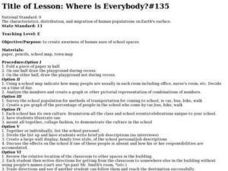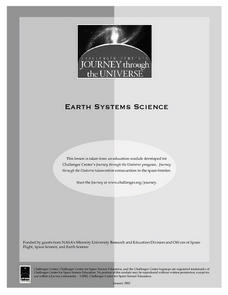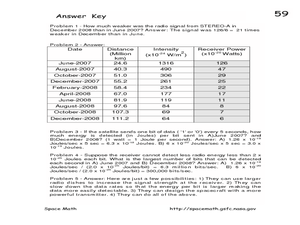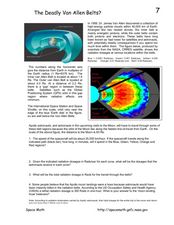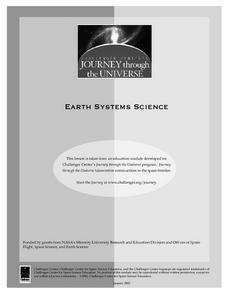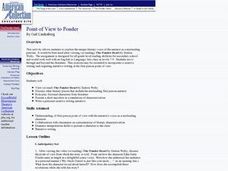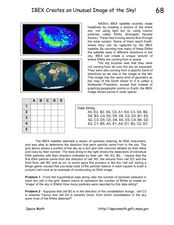Teach Engineering
Ranking the Rocks for Desired Properties
Math rocks! Cavern design teams determine the rankings of rock types based upon desirability points. The points are connected to the properties of the rocks and their usefulness in building a cavern.
Lunar and Planetary Institute
Oreo Moon Phases
Learning about the moon has never tasted delicious! Using the popular Oreo cookie as a model, young scientists carve out the cream filling to represent the different phases of the moon.
Curated OER
Solar System Challenge
For this solar system worksheet, students complete 13 multiple-choice questions to demonstrate their knowledge of the solar system.
Curated OER
Moon, Mars, and Beyond-Mission Briefing
Students complete this introductory instructional activity in which they find out about the scenario for a simulated online space mission. They review vocabulary and complete a review sheet to reinforce the details of the mission and its...
Curated OER
Where is Everybody?#135
Young scholars examine the human uses of school spaces through a variety of activities. They draw the playground during recess and not during recess. They determine how many people use each room at different times before graphing the...
Curated OER
Mensa For Kids: The Moon
First graders explore space science by completing an arts and crafts activity. In this moon lesson, 1st graders explore the geography of the moon and discuss the importance it has for people living on Earth. Students create a replica...
Curated OER
Rubber Gardens
Students recycle discarded automobile tires and create gardening sites for limited space areas.
Curated OER
Exploration of the Moon
In this moon worksheet, students will use a table with facts about the moon to answer questions about the moon's rotation, distance from the Earth, gravity, and temperature. Students will complete 9 short answer questions.
Curated OER
Rust Never Sleeps
Students investigate oxidation-reduction reactions involving iron by conducting an experiment in which they expose iron filings to different atmospheric and ocean conditions. They relate the results to the oxidation banding patterns seen...
Curated OER
The STEREO Mission: Getting The Message Across
In this STEREO satellites worksheet, students are given a chart with the intensity of the signals from the satellites received on Earth and the distances of the satellite from Earth. Students convert the intensity at each distance to...
Curated OER
The Dawn Mission: Ion Rockets and Spiral Orbits
In this ion rocket and orbits learning exercise, students read about the spiral orbit the Dawn spacecraft took due to its ion rocket motor. Students solve 3 problems including finding the path taken by the spacecraft, determining the...
Curated OER
A New Slant On The Seasons
Learners identify how the tilt and position of the Earth causes the seasons. After a discussion of the seasons and when they begin. Using themselves as the objects in the universe, they role play how the rotational movement of the...
Curated OER
The Deadly Van Allen Belts?
In this Van Allen Belts activity, students read about the deadly affects of the high energy particle clouds located around the Earth. Students answer 4 questions about the dosages of radiation astronauts receive in the zones of the Van...
Curated OER
Asteroids Between Mars and the Sun
For this asteroids of the solar system worksheet, students observe a diagram showing all the minor planets found in the orbit of Mars. Students answer 4 questions about the minor planets inside the orbit of other planets, they find the...
Curated OER
Magnetopause and Solar Storms
In this magnetopause worksheet, students use a given equation to find the distance from the Earth where the solar wind pressure and the Earth's magnetic field pressure are equal. Students are given 5 different solar storms and use the...
Curated OER
What is a greenhouse?
Students experiment to gain understanding of how a greenhouse retains heat. In this greenhouse instructional activity, students work with soda bottles and simulate a greenhouse. Students compare data from a vented and intact...
Curated OER
How Do We Explore Strange Environments?
Students identify and label the different parts of a robot, rover, or a spacecraft. They discuss and record all of the features their robot will need to accomplish its mission and be able to explain why they chose these features to...
Curated OER
soil, Water, and Plants
Students examine the relationship between water retention and plant growth by conducting two experiments. They first compare the water retention qualities of clay, sand and loam soil types. Then they use the data from the first...
Curated OER
THE WONDERFUL WATER CYCLE
Students are introduced to the processes of evaporation and condensation as they observe physical changes in water. They observe how matter changes from a solid to a liquid state. Students are explained that steam is water in its gaseous...
Curated OER
Point of View to Ponder
Students view (or read) The Ponder Heart by Eudora Welty. They
discuss other literary pieces that include the misleading first person narrator. They
role play fictional characters from literature and present a short anecdote in a...
Curated OER
SDO: Measuring the Speed of an Eruptive Prominence
In this eruptive prominence learning exercise, students read about a plasma ejection from the sun measured by the Solar Dynamics Observatory. Students solve 3 problems using the given diagrams of the ejection. They determine the scale of...
Curated OER
Student Exploration: Summer and Winter
In this recognizing the seasons online/interactive worksheet, students explore the Earth's positions and determine the summer and winter season. Students answer 21 short answer questions
Curated OER
Spitzer Sees a New Ring Around Saturn
In this Saturn's rings worksheet, students read about the Spitzer telescope that detected a new ring around Saturn. Students solve 6 problems including determining the formula for the area of a circle, finding the volume of the new ring...
Curated OER
IBEX Creates an Unusual Image of the Sky!
In this IBEX satellite activity, learners read about the Energetic Neutral Atoms that are detected by the IBEX satellite. Students use a given hypothetical data string to determine the number of particles detected and create an 'image'...






